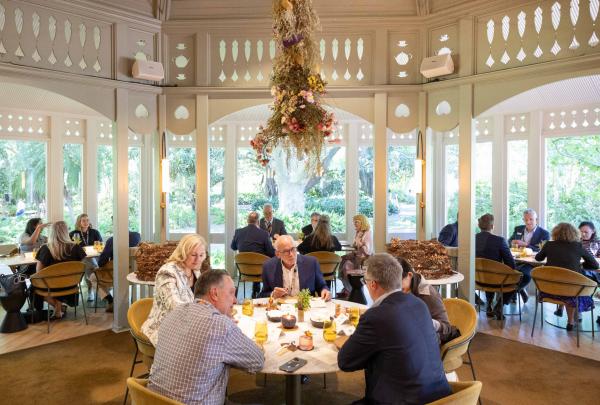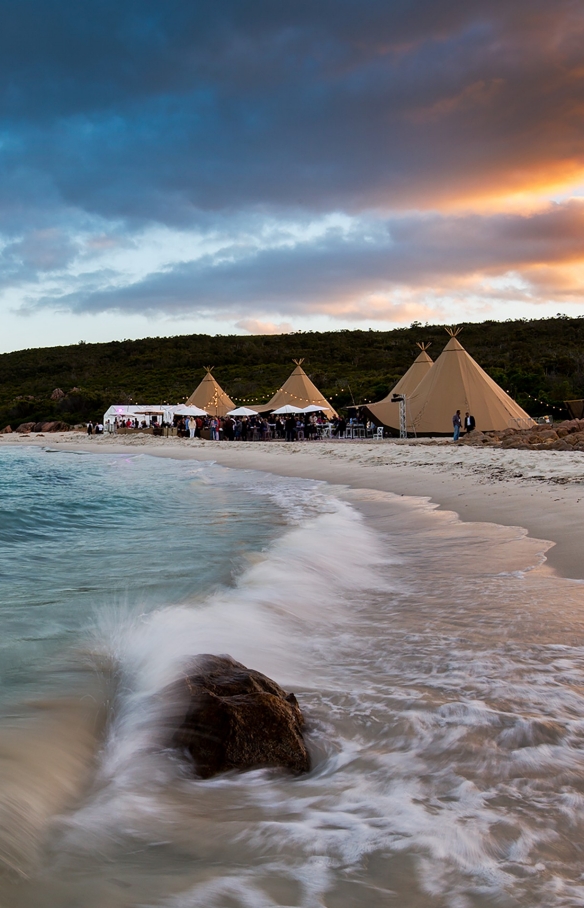
Seven ways to make your next Australian business event more sustainable
From the tropical north to the temperate south, Australia’s diverse landscape provides a spectacular backdrop for business events. Plenty of stays and experiences are finding ways to ensure their offering contributes to sustaining Australia’s natural beauty and preserving the world’s oldest culture. Here are seven ways you can increase the sustainability of your next business event in Australia.
Phillip Island Nature Parks, Victoria

Host your next corporate event at Phillip Island Nature Parks and help make a genuine impact towards conservation. Just 90 minutes from Melbourne/Narrm, this stunning, accessible destination offers unique meeting spaces, from the ocean-view Nobbies to the award-winning Penguin Parade Visitor Centre, with capacity for intimate meetings right through to 450-guest cocktail events. Enjoy tailored catering and memorable nature experiences while supporting vital conservation work – including climate change mitigation, wildlife habitat restoration, and more. Through the Penguin Foundation, your group can even sponsor a project and create a lasting legacy. It’s a powerful way to align your event with sustainability and purpose.
Adelaide Botanic Garden, Adelaide, South Australia

Restaurant Botanic, Adelaide Botanic Gardens, Adelaide, South Australia © Tourism Australia
Host your next event among lush greenery and lakeside views in the heart of Adelaide Botanic Garden. Hospitality and events specialists Blanco Horner bring a refined and deeply place-connected approach to business events across a range of venues that reflect the group’s commitment to sustainability, seasonal produce, and elegant hospitality. From elegant degustation dinners in the heritage rotunda at Restaurant Botanic — where native Australian ingredients and storytelling take centre stage—to relaxed twilight gatherings by the lake at Botanic Lodge, the experience is always grounded in nature and sustainability. For larger celebrations, the Rose Garden Pavilion offers a marquee space overlooking the International Rose Garden and can welcome up to 500 guests. Across each venue, Blanco Horner’s sustainable, garden-to-plate philosophy ensures every event is as thoughtful as it is memorable.
17 TREES, De Bortoli Wines, Bilbul, New South Wales

17 TREES, De Bortoli Wines, Bilbul, New South Wales © De Bortoli Wines
Venerated family winemakers De Bortoli have a range of sustainably produced wines — including a Shiraz, Pinot Grigio and Chardonnay — called 17 TREES. It is part of an ongoing commitment from the company to improve its sustainability practices right through from cultivation to production, carbon emissions and transportation. With the help of not-for-profit Trillion Trees, De Bortoli also plants one tree for every six 17 TREES bottles sold to help rebuild the native Australian bush. Groups can also visit De Bortoli’s founding vineyard in the Riverina region of New South Wales and partake in Emeri’s Garden Tour which explores 14 acres of native bushland, including a billabong, and finish with an exclusive wine tasting experience.
Koala Clancy Foundation, Victoria

Koala, Echidna Walkabout Nature Tours, You Yangs Regional Park, Victoria © Echidna Walkabout Nature Tours
The Koala Clancy Foundation (KCF) is dedicated to koala conservation through habitat restoration, community involvement, and scientific research. Aiming to plant 300,000 koala trees by 2030, the Foundation focuses on creating essential koala habitats and provides field support to critical koala research. Through the Corporates for Koalas program, businesses play a vital role in the conservation of one of Australia's iconic species, contributing to a legacy of environmental stewardship and community engagement. Corporate groups can partake in hands-on conservation experiences such as tree planting days, wildlife and weeding walks, and seed sowing, which contribute directly to KCF’s efforts and foster a deeper understanding about the importance of habitat conservation.
Ngadiku Dreamtime Walk at Mossman Gorge, Port Douglas, Queensland

Voyages Indigenous Tourism Australia, Mossman Gorge, Daintree National Park, Queensland © Voyages Indigenous Tourism Australia
Take a journey to Australia’s ancient roots with a Ngadiku Dreamtime Walk through Mossman Gorge in the Daintree Rainforest, 20 minutes’ drive from Port Douglas in Tropical North Queensland. After a traditional Welcome to Country and a Smoking Ceremony, which protect visitors during their trip, the walk is led by an Indigenous guide who delves into the deep spiritual and cultural connection the local Kuku Yalanji people have to the land. Walks end with bush tea and damper (Australian bread usually cooked in the coals of a campfire or in a bush oven) or a two-course lunch incorporating local ingredients can be catered onsite. The organisation behind this experience, Voyages Indigenous Tourism Australia, is committed to giving back to Indigenous communities through training, employment, business, and sharing of their cultures. Voyages also operates the sprawling Ayers Rock Resort at Uluru, helping to sustain the world’s oldest culture in Australia’s spiritual heart.
Gili Rooftop, Sydney, New South Wales

Gili Rooftop, Taronga Zoo, Sydney, New South Wales © Epicure at Taronga Zoo Sydney
It’s no secret Taronga Zoo has one of the best views in Sydney and so too does its newest venue, the Gili Rooftop. With views back onto Sydney Harbour and its world-famous bridge, the space can host up to 80 guests for a cocktail function. The venue is catered by Trippas White Group, whose menus are inspired by sustainable and locally produced seasonal ingredients. This growing stable of world-class venues and the sustainably built 62-room Wildlife Retreat at Taronga is a way for the century-old not-for-profit organisation to fund its research and wildlife conservation.
Sal Salis, Ningaloo Coast, Western Australia

For small groups looking for an incredible sustainable stay in remote beauty along Western Australia’s World Heritage-listed coastline, Sal Salis is the answer. Nestled amongst the sand dunes in Cape Range National Park near Exmouth, this luxurious beach safari camp offers a glamping experience like no other. Nearly 100 percent of power for Sal Salis is solar generated through an array of solar panels and the whole camp is constructed to have minimal impact on its natural setting. With no internet or phone signal, guests can fully unplug, while ocean-facing tents stay naturally cool with the sea breeze—no air-conditioning needed. Each en-suite includes a Nature Loo (a composting toilet cleaned off-site), and grey water from showers and basins is filtered before returning to the ground. Throw in locally produced, natural bathroom amenities and chemical-free organic cotton linen in each of the 16 tents on site and it’s quite literally an experience to feel good about.
Updated: 23 May 2025

















